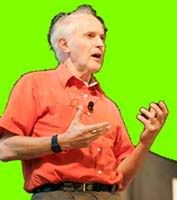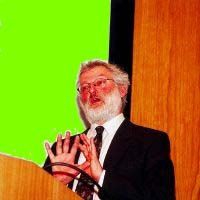The same dark forces in our society who want to stifle argument about climate change are doing the same for the so-called debate which sees faith and science as opposed and irreconcilable.

This debate is being fought ostensibly on the 4004 front, ie concentrating on Bishop Ussher's chronology which placed Creation as starting on the evening of Sunday, October 23 of that year.
Personally, I don't know anybody who believes this, although I realise there are some members in many Christian denominations who do.
However, the
 mere fact of issues relating to faith being in the public sphere is raising the hackles of figures who would like to chase religion and religionists out of public life. Thus, Professor Michael Reiss (left), until recently director of education at the Royal Society, Great Britain's premier scientific institution, stepped down from his post yesterday after, as the First Post put it, "he appeared to suggest in a speech last week that creationism should be taught in schools alongside evolution". As he objected on the BBC's Jeremy Vine show on Friday 12 September, when the furore was let loose, this was not what he said. Indeed, he had posted on his Guardian blog the day before:
mere fact of issues relating to faith being in the public sphere is raising the hackles of figures who would like to chase religion and religionists out of public life. Thus, Professor Michael Reiss (left), until recently director of education at the Royal Society, Great Britain's premier scientific institution, stepped down from his post yesterday after, as the First Post put it, "he appeared to suggest in a speech last week that creationism should be taught in schools alongside evolution". As he objected on the BBC's Jeremy Vine show on Friday 12 September, when the furore was let loose, this was not what he said. Indeed, he had posted on his Guardian blog the day before:the excellent book Science, Evolution, and Creationism published by the US National Academy of Sciences and Institute of Medicine, asserts: "The ideas offered by intelligent design creationists are not the products of scientific reasoning. Discussing these ideas in science classes would not be appropriate given their lack of scientific support."So far so fair. But this intellectual honesty forced the real reasons for objections within the Royal Society to Reiss's education post into the open: he is a Church of England priest. As the backlash was being orchestrated, Richard Dawkins stated, as he admitted in a letter he was "working on" getting published in the British press, that "A clergyman in charge of education for the country's leading scientific organisation - it's a Monty Python sketch". (The letter was snapped up by New Scientist. Unlike most of NS's long articles, you can view the whole article without taking out a subscription.)
I agree with the first sentence but disagree with the second. Just because something lacks scientific support doesn't seem to me a sufficient reason to omit it from a science lesson. When I was taught physics at school, and taught it extremely well in my view, what I remember finding so exciting was that we could discuss almost anything providing we were prepared to defend our thinking in a way that admitted objective evidence and logical argument...
I do believe in taking seriously and respectfully the concerns of students who do not accept the theory of evolution, while still introducing them to it. While it is unlikely that this will help students who have a conflict between science and their religious beliefs to resolve the conflict, good science teaching can help students to manage it – and to learn more science.
The letter that seems to have hit the Royal Society's main artery was a letter by Sir Richard Roberts stating that
We gather Professor Reiss is a clergyman, which in itself is very worrisome. Who on earth thought that he would be an appropriate Director of Education, who could be expected to answer questions about the differences between science and religion in a scientific, reasoned way?...Ill-conceived opinions by a representative of the RS will only encourage those teachers, both scientists and otherwise, with a creationist agenda to speak about it to their students in the classroom.The letter is reproduced by a volunteer for the Richard Dawkins Foundation for Reason & Science, who comments on his blog:
Is it possible that Sir Richard has not read Reiss’ actual articles?...criticism of Reiss should be based on his actions, and not speculation or misunderstanding of what he has done...Sir Roberts [sic] sent his letter the day after the Royal Society sent a press release with Reiss’ clarification. My concern is that this whole fiasco will turn into a farce that will not exactly show secularist and those for science education in a positive light."I am sure that the text of any official speech made ex cathedra by a senior Royal Society office-holder would have been made available to senior RS members shortly afterwards, if not before. Pace the respect for reason and truth of Homo Economicus shown above, he doesn't seem to have quite gotten the point of this plot. Rev Reiss would have been pushed if he had said nothing more controversial than "if you boil water y
 ou will get steam". His role as RS Director of Education was scheduled for destruction by virtue of his being an ordained priest and nothing else. Dawkins, the Establishment's pet atheist, and the éminences grises Sir Richard Roberts, Sir Harry Kroto and Sir John Sulston decided he had to go, and Daniel Palmer strained foaming at the leash in his New Scientist blog.
ou will get steam". His role as RS Director of Education was scheduled for destruction by virtue of his being an ordained priest and nothing else. Dawkins, the Establishment's pet atheist, and the éminences grises Sir Richard Roberts, Sir Harry Kroto and Sir John Sulston decided he had to go, and Daniel Palmer strained foaming at the leash in his New Scientist blog.At the end of a series of bogs about Dawkin's series on Charles Darwin, I asked: "Personally, I trust in God. You may have another position, which indeed you have every right to hold: but can you justify it outside the realm of strangling those voices with whom you disagree?"
Dawkins, it seems, is at the service of those who have neither that disposition nor ability.












No comments:
Post a Comment
Please feel free to leave a comment - Frugal Dougal.